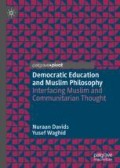Abstract
In this chapter, we proffer an argument for an interrelationship between the physical–intellectual and emotional dimensions of human life. In reference to the seminal thoughts of al-Attas, we argue that educational human encounters are constituted by the rational and the emotional dimensions of human action. Of pertinence to our non-bifurcationist view of knowledge, our contention is that human encounters about credible speech and respectful human conduct, have the potential to cultivate democratic human relations—referred to by al-Attas as actions grounded in adab. In the main, the point about democratic human encounters is that such encounters cannot be blind to the physical–intellectual and the emotional aspects of human life. Rather, as we argue, expressions of adab—that is, to act with refinement and decorum—can advance and enhance democratic encounters, through consciously averting disrespect and dismissiveness.
Access this chapter
Tax calculation will be finalised at checkout
Purchases are for personal use only
References
Al-Attas, S.M.N. 1980. The Concept of Education in Islam: A Framework for an Islamic Philosophy of Education. Kuala Lumpur: International Institute of Islamic Thought and Civilisation Publications.
———. 1993. Islam and Secularism. Kuala Lumpur: International Institute of Islamic Thought and Civilisation Publications.
———. 2005. Islam and Secularism. Journal of Islamic Philosophy 1: 11–43.
Al-Qardawi, Y. 1981. Al-Khasā’is al-‘ammah lil Islāmi [The Universal Characteristics of Islam]. Qaherah: Maktabah Wahbah.
Halstead, J.M. 2004. An Islamic Concept of Education. Comparative Education 40 (4): 517–530.
———. 2007. Islamic Values: A Distinctive Framework for Moral Education? Journal of Moral Education 36 (3): 283–296.
Kirabiev, N. 2004. Paideia and Adab in Islam. In Educating for Democracy: Paideia in an Age of Uncertainty, ed. A.M. Olson, D.M. Steiner, and I.S. Tuuli, 97–102. New York: Rowan & Littlefield.
Saada, N. 2018. The Theology of Islamic Education from Salafi and Liberal Perspectives. Religious Education 113 (4): 406–418.
Author information
Authors and Affiliations
Corresponding author
Rights and permissions
Copyright information
© 2019 The Author(s)
About this chapter
Cite this chapter
Davids, N., Waghid, Y. (2019). Adab and Democratic Education. In: Democratic Education and Muslim Philosophy. Palgrave Pivot, Cham. https://doi.org/10.1007/978-3-030-30056-2_6
Download citation
DOI: https://doi.org/10.1007/978-3-030-30056-2_6
Published:
Publisher Name: Palgrave Pivot, Cham
Print ISBN: 978-3-030-30055-5
Online ISBN: 978-3-030-30056-2
eBook Packages: EducationEducation (R0)

